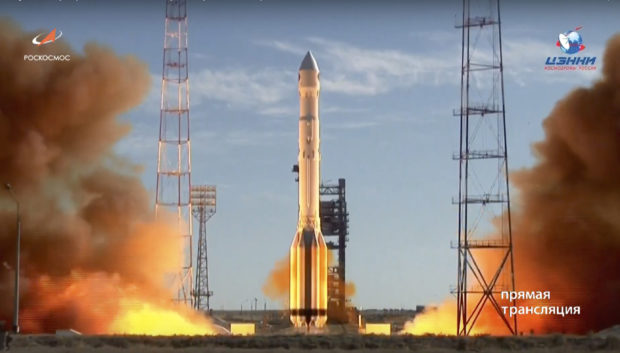Russia launches major new telescope into space after delays

In this frame grab taken from video on Saturday, July 13, 2019, and distributed by Roscosmos Space Agency Press Service, a Russian Proton-M rocket takes off from the launch pad at Russia’s space facility in Baikonur, Kazakhstan. A Russian Proton-M rocket successfully delivered a cutting-edge space telescope into orbit Saturday after days of launch delays, Russia’s space agency said. (Roscosmos Space Agency Press Service photo via AP)
MOSCOW – A Russian Proton-M rocket successfully delivered a cutting-edge space telescope into orbit Saturday after days of launch delays, Russia’s space agency said.
Roscosmos said the telescope, named Spektr-RG, was delivered into a parking orbit before a final burn Saturday that kicked the spacecraft out of Earth’s orbit and on to its final destination: the L2 Lagrange point.
Lagrange points are unique positions in the solar system where objects can maintain their position relative to the sun and the planets that orbit it. Located 1.5 million kilometers (0.93 million miles) from Earth, L2 is particularly ideal for telescopes such as Spektr-RG.
If all goes well, the telescope will arrive at its designated position in three months, becoming the first Russian spacecraft to operate beyond Earth’s orbit since the Soviet era. The telescope aims to conduct a complete x-ray survey of the sky by 2025, the first space telescope to do so.
The Russian accomplishment comes as the U.S. space agency NASA celebrates the 50th anniversary of the Apollo 11 moon landing on July 20, 1969.
Article continues after this advertisementRussian space science missions have suffered greatly since the 1991 collapse of the Soviet Union. Budget cuts have forced the Russian space program to shift toward more commercial efforts.
Article continues after this advertisementA Russian Mars probe, called Mars 96, failed to leave Earth’s orbit in 1996. A later attempt to send a probe to Mars, called Fobos-Grunt, suffered a similar fate in 2011.
Work on Spektr-RG telescope began in the 1980s but was scrapped in the 1990s. Spektr-RG was revived in 2005 and redesigned to be smaller, simpler and cheaper.
In its modern form, the project is a close collaboration between Russian and German scientists, who both installed telescope equipment aboard the Russian spacecraft. /gsg